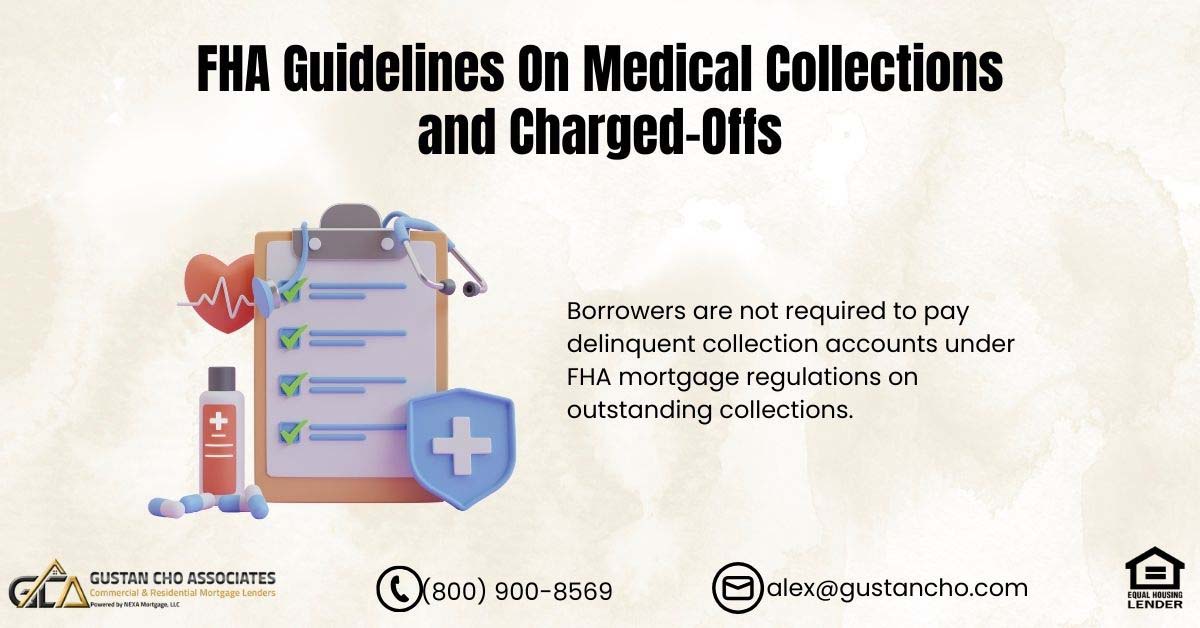FHA Guidelines on Medical Collections: Everything You Need to Know in 2024
Are medical collections standing in your dream of buying a home? Good news! FHA loans might be your best option to qualify for a mortgage—even if you have medical debt.
In this blog post, we’ll walk you through the updated FHA guidelines on medical collections for 2024. You’ll learn how FHA handles medical collections, how they differ from other types of debt, and how you can improve your chances of getting approved. Whether you’re planning to purchase or refinance a home, understanding these guidelines will help you confidently take the next steps.
Understanding FHA Loans and Medical Collections
The FHA or Federal Housing Administration backs FHA loans, and it is a division of the Department of Housing and Urban Development (HUD). These loans are popular among borrowers with less-than-perfect credit, lower down payments, and even those with medical collections on their credit reports. If you’ve been worried about unpaid medical bills hurting your chances, FHA loans offer flexibility that can help you get approved.
Key Question: What makes medical collections different?
Medical collections are treated more leniently than other types of unpaid debts. Unlike non-medical debts, FHA guidelines do not require you to pay off medical collections to qualify for a mortgage. Medical bills often come unexpectedly and don’t necessarily reflect poor financial habits.
Why does this matter to you?
If you’ve been struggling to keep up with medical bills, FHA loans give you a way to move forward without clearing those debts first.
Worried About Medical Collections? You Can Still Qualify for an FHA Loan!
Contact us today to learn how you can still qualify for an FHA loan, even with medical debt.
2024 FHA Guidelines on Medical Collections
The FHA guidelines on medical collections have been updated for 2024 to reflect current lending practices and borrower circumstances. Here’s what you need to know:
1. No Requirement to Pay Off Medical Collections
FHA does not require paying off unpaid medical collections before approving your loan. Medical debts are excluded from the debt-to-income (DTI) ratio calculation, meaning they won’t count against your ability to qualify for a loan.
What does this mean for you?
Even if you have medical bills in collections, you can still move forward with your home purchase or refinance without worrying about paying off those debts.
2. Automated Underwriting System (AUS)
AUS, or Automated Underwriting System, is a computer program lenders use to quickly determine if you qualify for a loan. Consistent payments over at least 12 months are essential, as they show lenders you have a trustworthy record, which enhances your chances of loan approval through AUS.
3. Lender Overlays Can Differ
Some lenders have additional “lender overlays” rules that go beyond the FHA’s basic guidelines. For instance, while the FHA doesn’t require you to pay off medical debts, some lenders might still consider them in their decisions.
Think of it like store policies—some stores may have stricter return rules just because the manufacturer allows returns.
Tip: Don’t give up if a lender denies your loan because of medical collections. Try contacting another lender who may be more understanding of FHA’s flexible stance on medical debts.
How Medical Collections Affect Your Debt-to-Income (DTI) Ratio
Some great news: medical collections are excluded from your DTI ratio when applying for an FHA loan. This is a huge advantage for borrowers with high medical debt, as it won’t negatively impact the mortgage you qualify for.
For example, if you have $5,000 in unpaid medical collections, FHA won’t include this in your DTI calculations. So, even if your medical collections seem overwhelming, they won’t affect your ability to qualify for a mortgage loan.
What’s the DTI ratio?
Your debt-to-income (DTI) ratio shows the portion of your monthly earnings allocated to debt repayments. Lenders utilize this ratio to determine if you can manage a mortgage. The Federal Housing Administration (FHA) usually allows a maximum DTI of 43%. However, some lenders may accept higher ratios if you have advantages like a strong credit score or a large down payment. If you have good financial strength in other areas, you might still qualify for a mortgage even if your DTI is above 43%.
The Difference Between Medical and Non-Medical Collections
FHA makes an important distinction between medical and non-medical collections. While medical collections are more leniently treated, non-medical collections are handled differently.
Here’s what you need to know:
- Medical Collections: FHA does not require medical collections to be paid off. They are excluded from your DTI ratio calculation.
- Non-Medical Collections: If your non-medical collections total more than $2,000, FHA will require the lender to include 5% of the total balance as a “theoretical monthly payment” in your DTI ratio, even if you’re not actively making payments. This can increase your DTI ratio and affect your approval.
Real-Life Example: FHA Loan with Medical Collections
Let’s say Sarah is applying for an FHA loan. She has $4,000 in unpaid medical collections but no other major debts. She’s worried that these collections will hurt her chances of getting a loan. Fortunately, her lender doesn’t consider these debts because medical collections are excluded from her DTI ratio calculation. Sarah can qualify for an FHA loan and purchase her first home.
What if Sarah had non-medical collections?
Suppose Sarah has outstanding non-medical collections that total over $2,000. In that case, the lender will assess 5% of this unpaid amount to estimate a hypothetical monthly payment that would factor into her debt-to-income (DTI) ratio. For example, if her collections amount to $2,500, the calculation would be 5% of $2,500, which equals $125.
This means that, in the eyes of the lender, Sarah would have an additional monthly payment of $125 added to her existing debts. This new figure would be included in her DTI ratio calculations, potentially making it harder for her to meet the lender’s mortgage or personal loan qualifications.
Therefore, managing these collections effectively is crucial for maintaining a favorable DTI ratio and improving her chances of securing financing.
Struggling with Medical Collections? Let Us Help You Secure an FHA Loan
Contact us today for expert guidance on overcoming medical debt and getting approved.
Can You Dispute Medical Collections on Your Credit Report?
Absolutely! You have the option to dispute the medical collections by contacting the credit bureaus if you encounter any issues. Rectifying incorrect medical collections can enhance your credit score, ultimately assisting you in securing improved loan terms.
However, it’s important to note that FHA guidelines for 2024 exempt medical collections from dispute removal requirements during the mortgage process. This means you can leave a dispute in place for medical collections without it impacting your ability to get an FHA loan.
What About Charged-Off Accounts?
Many borrowers ask how the FHA deals with charged-off accounts and medical collections. Here’s what you need to know:
Charged-off accounts are debts that creditors have given up on collecting, meaning they don’t expect to get paid. According to FHA guidelines, these accounts count as having a zero balance, so they won’t hurt your debt-to-income ratio (DTI) or your chance of getting a loan.
However, you must resolve credit disputes on charged-off accounts before continuing the mortgage process. If you disagree with a non-medical charged-off account, be ready to retract it to avoid delays.
How to Improve Your Chances of FHA Loan Approval in 2024
Even with medical collections, you can take steps to improve your chances of getting approved for an FHA loan. Here are some practical tips:
- Make Timely Payments: Keep up with your other bills and debts to show lenders you’re responsible for your finances. A good payment history over the past 12 months is key to getting approved for an FHA loan.
- Check Your Credit Report: Obtain your credit report and carefully examine it for any mistakes, particularly relating to medical collections. If you identify any inaccuracies, make sure to challenge them in order to enhance your credit score.
- Reduce Other Debts: If possible, pay down non-medical debts like credit cards or personal loans. This will lower your DTI ratio and increase your chances of approval.
- Consider a Payment Plan for Large Collections: Consider setting up a formal payment plan with the creditor if you have significant non-medical collections. FHA allows you to use the monthly payment from a payment plan instead of the standard 5% calculation, which could lower your DTI ratio.
What to Do if Your Lender Has Lender Overlays
If your lender has stricter requirements (lender overlays), you might be told to pay off medical collections or remove disputes. This can be frustrating, especially since FHA’s guidelines are more flexible.
What can you do?
Reach out to a lender like Gustan Cho Associates>, who works with borrowers with challenging credit situations, including medical collections. They can help you navigate the guidelines and find a loan that works for you.
Ready to Apply for an FHA Loan with Medical Collections?
If you’re ready to move forward with your home purchase or refinance, an FHA loan could be the perfect solution—even if you have medical collections on your credit report. The 2024 FHA guidelines are designed to help borrowers in your situation. Remember, medical debt doesn’t have to hold you back from achieving your dream of homeownership.
Don’t wait—take the next step today!
Click here to pre-qualify for an FHA loan, or contact us for more information.
Need help?
Feel free to reach out if you have any questions about how medical collections impact your FHA loan application. We’re here to guide you every step of the way. Call us today, and let’s get started on your journey to homeownership!
Medical Collections Not a Problem for FHA Loans
Get in touch now to find out how you can qualify for an FHA loan and move forward with your purchase.
Frequently Asked Questions About FHA Guidelines on Medical Collections:
Q: What are the FHA Guidelines on Medical Collections?
A: The FHA guidelines on medical collections for 2024 don’t require you to pay off medical collections to qualify for a loan. These debts are excluded from the debt-to-income (DTI) ratio so they won’t affect your loan approval.
Q: Do I Have to Pay Off my Medical Collections Before Getting an FHA Loan?
A: According to FHA guidelines on medical collections, you don’t have to pay off medical collections to get approved. This is one of the benefits of an FHA loan!
Q: How do Medical Collections Affect my Debt-to-Income (DTI) Ratio?
A: FHA guidelines on medical collections exclude medical debt from your DTI ratio calculation. This means that even if you have unpaid medical bills, they won’t count against your ability to qualify for a mortgage.
Q: What is the Difference Between Medical and Non-Medical Collections?
A: Medical collections are treated more leniently under FHA guidelines. You don’t have to pay them off; they don’t impact your DTI. Non-medical collections, however, may affect your DTI if the balance is over $2,000.
Q: Can I Still Qualify for an FHA Loan with Unpaid Medical Bills?
A: Yes! Under FHA guidelines on medical collections, unpaid medical bills won’t stop you from qualifying for a loan. The FHA understands that medical debt doesn’t necessarily mean you’re irresponsible with money.
Q: Can I Dispute Medical Collections on my Credit Report While Applying for an FHA Loan?
A: Yes, you can dispute medical collections. FHA guidelines for 2024 allow disputes to stay on your report without affecting the loan approval process.
Q: What Happens if my Lender Asks me to Pay Off Medical Collections?
A: Some lenders might have stricter rules (lender overlays), but FHA guidelines on medical collections don’t require this. You can try another lender who follows the FHA’s flexible rules.
Q: Do I Need to Remove Disputes From my Credit Report for Medical Collections?
A: No, FHA guidelines on medical collections don’t require you to remove disputes from your credit report, so you can leave them without affecting your mortgage application.
Q: How Can I Improve my Chances of Getting an FHA Loan with Medical Collections?
A: To boost your chances, make sure your other payments (like credit cards and loans) are up to date, check your credit report for mistakes, and keep your overall debt as low as possible.
Q: Will Charged-Off Accounts Impact my FHA Loan Approval?
A: No, charged-off accounts are treated as having a zero balance under FHA guidelines. However, to avoid delays, you may need to resolve any credit disputes related to non-medical charge-offs.
This blog about “FHA Guidelines On Medical Collections and Charged-Offs” was updated on October 10th, 2024.
Need Help with FHA Loans and Medical Collections?
Reach out to us today to explore your options and take the next step toward homeownership!










